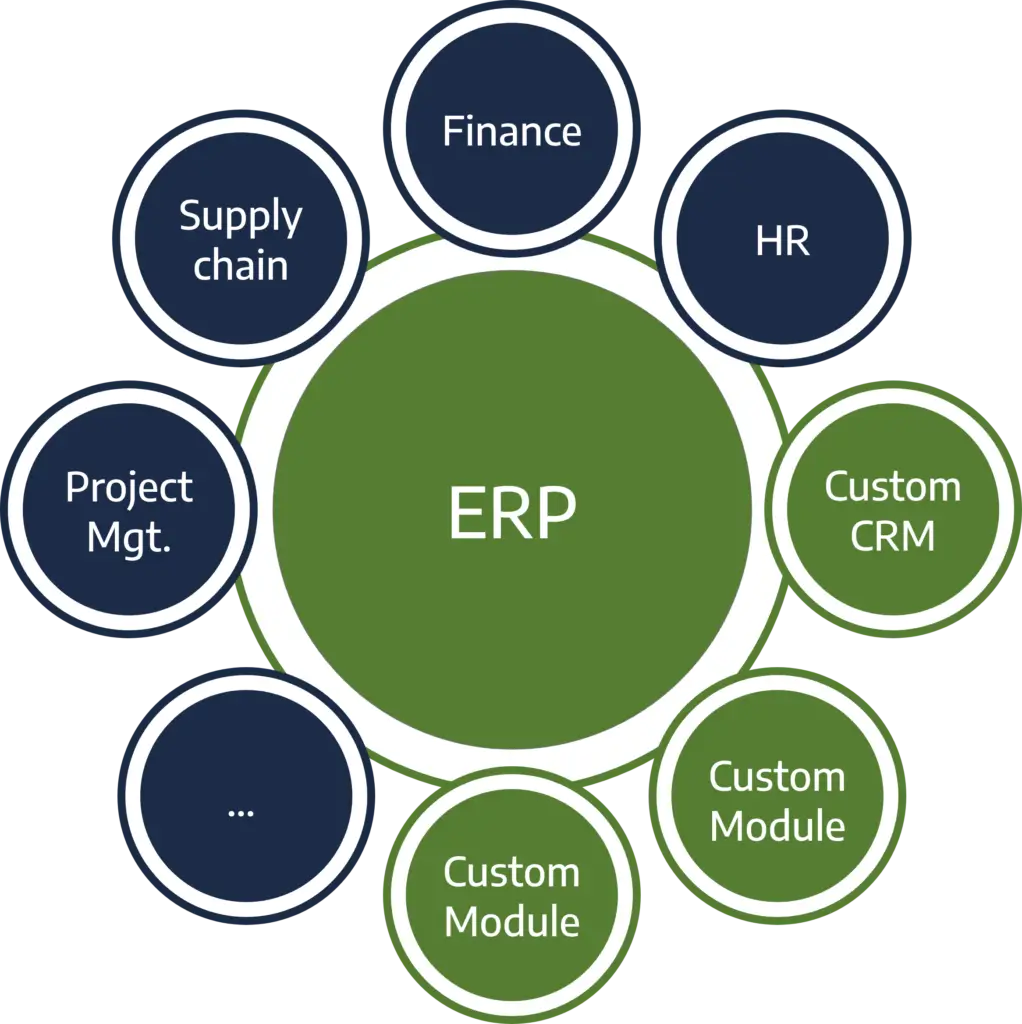In the ever-changing world of business, efficiency and adaptability are critical. For over twenty years, I’ve helped many organizations digitize their processes for optimal performance. One popular solution is to implement an ERP system. This article explains what an ERP is, when a custom ERP is needed, and the importance of compliance, access control, and privacy.
Defining ERP and its core functions
What is an ERP?
An ERP system or Enterprise Resource Planning system is an integrated software solution. It streamlines and consolidates diverse business processes, functions and data into a single, cohesive platform.
This powerful tool allows organizations to efficiently manage resources, simplify operations and make well-informed decisions based on real-time data insights.
By connecting various departments, such as finance, human resources, customer relations, inventory control and project management, an ERP system fosters seamless communication and collaboration across the entire organization. Ultimately, implementing an ERP solution contributes to increased productivity, cost reduction and enhanced competitiveness in the rapidly evolving business landscape.
Core functions of an ERP system
I have witnessed the remarkable impact ERP systems have on optimizing business performance and streamlining operations. They consolidate key functions onto a single platform, helping companies operate efficiently and make data-driven decisions.
First, financial management is an essential part of an ERP system. It provides real-time financial data, simplifies accounting, and facilitates accurate forecasting. Next, human resources management helps manage the employee lifecycle, from hiring to performance reviews to payroll.
Next, customer relationship management (CRM) improves customer interactions. It tracks leads, manages sales pipelines, and ensures customer satisfaction. Meanwhile, supply chain management helps companies monitor their supply chains to ensure timely deliveries and effective supplier collaboration.
Project management capabilities are also important. They enable companies to plan, track and execute projects for better resource allocation and improved project outcomes. Inventory control is another key function that helps manage inventory levels, reduce waste, and maintain optimal inventory levels.
Standard ERP systems offer a wide range of functionality. However, they may not always meet your unique business needs. This is where custom ERP solutions come into play. In the next chapter, we’ll discuss the benefits of custom ERP systems. They can be tailored to perfectly fit your company’s needs and processes.

When to opt for a custom ERP system
Unique business processes
Selecting a custom ERP system becomes essential for businesses with unique processes and specific needs that standard, off-the-shelf software cannot fulfill. For instance, pharmaceutical companies often adhere to stringent procedures, as do aerospace manufacturers and highly regulated financial institutions.
Off-the-shelf solutions might not always cater to unique business processes, forcing organizations to adjust their operations to fit the constraints of the software. Custom ERP solutions, on the other hand, is tailored to align with specific business requirements, allowing for seamless integration with existing processes and workflows.
By opting for a tailored ERP system, these organizations ensure that their specific requirements are met, resulting in a more efficient and effective management tool. In essence, customization guarantees that the ERP system seamlessly aligns with a company’s distinct needs, ultimately enhancing overall performance.
Scalability and flexibility
Opting for a custom ERP system offers significant advantages in these areas when compared to off-the-shelf alternatives. This is particularly crucial for businesses with ambitious growth plans or those operating in dynamic industries where swift adaptation to market changes is a necessity.
One of the primary reasons to choose a custom ERP system is its ability to scale with your business. For example, startups and small-to-medium enterprises (SMEs) often experience rapid growth, requiring systems that effortlessly expand to accommodate increasing demands. A custom ERP system is designed with scalability in mind, ensuring that as your business grows, your management tools adapt without compromising efficiency or effectiveness.
Industries such as e-commerce, technology and renewable energy are prime examples of sectors that benefit from scalable and flexible ERP solutions. These industries often experience rapid changes in market conditions, customer preferences and regulatory requirements. A custom ERP system provides the agility needed to respond to these challenges and maintain a competitive edge.
Competitive advantage
Staying competitive is critical. One way to do that is with an ERP solution tailored to your unique business needs. Such solutions allow companies to innovate faster, adapt to ever-changing market trends, and stand out from the competition.
Custom ERP systems are great for fostering innovative ideas. They offer features that address your specific business needs. For example, a renewable energy company might need an ERP that can manage complex tasks. It also needs to track compliance and analyze real-time data for intelligent decision making. A custom ERP system can provide these unique capabilities, allowing your company to stay ahead of the curve and innovate within the industry.
Adaptability is another advantage of custom ERP systems. They easily adapt to changing market conditions. For example, the retail, technology, and logistics industries are constantly changing. A custom ERP system can quickly respond to these changes and take advantage of new opportunities. Let’s say an e-commerce company needs to change its supply chain strategy to meet new consumer demands. A custom ERP solution can easily adapt to these changes, keeping the company agile and competitive.
Custom ERP solutions also allow companies to differentiate themselves by offering unique services. This is critical in competitive industries such as hospitality or healthcare. For example, a hotel chain may need a customized ERP system to manage its loyalty program and customer reservations. This customized solution improves the guest experience and increases customer loyalty, setting the hotel chain apart from its competitors.
Legacy system integration
Technology advances at a rapid pace. Companies often struggle to integrate old systems with new ones. This is where custom ERP systems can be a game changer. They allow for easy integration and ensure that important data and processes remain accessible in the new system. This approach not only connects old and new, but also leverages modern technologies like big data and AI to gain new insights from old data.
Industries such as manufacturing, healthcare, and banking often rely on legacy systems. These systems may still work, but they may lack modern ERP functionality. A custom ERP system integrates seamlessly with these existing systems, ensuring a seamless transition with minimal business disruption.
Consider a manufacturing company with a well-established supply chain system that needs a technology upgrade to stay competitive. A custom ERP solution allows the company to retain its valuable data and processes. At the same time, it can take advantage of modern ERP functionality.
There are two main methods of integrating legacy systems with custom ERP solutions. The first option is to move all data and processes into a new ERP system. This preserves existing information and workflows and allows companies to take advantage of the latest technology and functionality to improve efficiency and decision-making.
The second option is to create a seamless connection between the legacy system and the new ERP solution. This approach allows companies to continue using their existing systems while gradually adopting the advanced capabilities of the new ERP. This integration method is particularly beneficial for companies with complex processes that are difficult to replicate in a new system.
Enhanced interoperability for existing ERP systems
Custom ERP solutions have a significant advantage over off-the-shelf alternatives. They overcome the challenges of integrating new modules into existing ERP systems. With a custom solution, companies can develop specific modules that seamlessly integrate with their existing systems through APIs.
Certain industries, such as retail, manufacturing, and healthcare, often require ERP system upgrades. Integrating new modules without disrupting operations can be a challenge.
Consider a retail company that is growing and needs more e-commerce capabilities. A custom ERP solution can add these tools by integrating with the current system through APIs. This keeps operations running smoothly while adding new functionality.
Or a healthcare provider may need advanced data analytics for patient care and administrative tasks. A custom ERP solution enables the creation of these specific data analytics modules. They integrate seamlessly with the current system, minimizing disruption to patient care.
Custom ERP solutions also future-proof organizations by adapting to changing business needs. As an organization’s needs evolve, custom ERP systems can incorporate new features or modules. This ensures that the organization remains agile and responsive to market demands.
Compliance, access control and privacy
Custom ERP systems are uniquely positioned to address compliance, access control and privacy, providing organizations with tailored systems that meet their specific needs and requirements. We will explore the various ways custom ERP solutions outshine off-the-shelf options with real-world examples from various industries. Discover how a custom ERP system is helping businesses maintain regulatory compliance, safeguard sensitive data and protect customer trust in an increasingly complex digital environment.
Ensuring compliance
Adherence to industry-specific requirements is critical for companies in highly regulated industries such as healthcare, finance, and manufacturing. Custom ERP systems address these stringent requirements, ensuring compliance and minimizing the risk of penalties or reputational damage.
A key advantage of custom ERP systems is their adaptability to unique regulatory requirements. With a custom solution, companies align their ERP system with the specific compliance requirements of their industry, including regional and international regulations.
For example, healthcare organizations must comply with strict data privacy and security regulations such as the EU’s GDPR and the US’s HIPAA. A customized ERP solution is designed to meet these requirements, offering robust data encryption, access control, and auditing capabilities. This protects sensitive patient information and ensures compliance.
Financial institutions also face stringent compliance requirements in areas such as anti-money laundering (AML), know-your-customer (KYC), and data security. A customized ERP system can support these complex regulations with features such as transaction monitoring, risk assessment, and automated reporting.
Manufacturing companies also face stringent regulatory requirements. These include the EU’s NIS2 directive for network and information system security. Custom ERP solutions can provide advanced capabilities for supply chain security, incident reporting, and risk management.
Custom ERP systems can also adapt to changing compliance landscapes. They’re easily updated or modified to meet new regulations, helping companies stay compliant and avoid potential risks.
In addition, custom ERP solutions provide greater control over data, helping to manage access and ensure data privacy. A custom system is tailored to the unique needs of the business, protecting sensitive information from unauthorized access or breaches.
Robust access control
Safeguarding sensitive information and maintaining strict access control is crucial for organizations across various industries. Custom ERP solutions enable businesses to implement robust access control measures tailored to their unique needs, ensuring that sensitive data is protected and only accessible by authorized personnel. This not only enhances security but also helps organizations comply with stringent regulations such as the European Union’s NIS2 Directive and General Data Protection Regulation (GDPR).
One of the key advantages of custom ERP systems is their adaptability to an organization’s specific requirements. By opting for a custom solution, businesses establish access control measures that align with their unique needs and processes, effectively safeguarding sensitive information from unauthorized access and potential data breaches.
For example, a pharmaceutical company may need to restrict access to sensitive data such as intellectual property, research results and patient information. With a custom ERP solution, the organization implements stringent access control measures, including role-based access, multi-factor authentication and detailed audit trails, ensuring that sensitive information is only accessible to authorized personnel.
Similarly, a financial institution may require robust access control measures to protect client data, transaction records and other sensitive information. A custom ERP system is tailored to address these needs, enabling the organization to implement security features such as data encryption, granular access permissions and secure data storage, ultimately maintaining compliance with financial regulations and safeguarding client trust.
Manufacturing companies, particularly those operating in strategic industries, also benefit from custom ERP solutions with robust access control features. By adhering to the European Union’s NIS2 Directive and GDPR requirements, organizations ensure the security and resilience of their digital infrastructure, protecting sensitive supply chain information and minimizing the risk of cyber-attacks or data breaches.
Furthermore, custom ERP solutions offer businesses the flexibility to adapt their access control measures as their needs evolve or new regulations emerge. This adaptability is crucial in a rapidly changing regulatory environment, allowing organizations to maintain compliance and protect their sensitive data effectively.
Enhanced privacy
Ensuring data privacy has become a top priority for businesses across various industries. Custom ERP solutions offer enhanced privacy and data protection features, enabling organizations to safeguard their valuable information and maintain customer trust. By incorporating advanced encryption and security protocols, custom ERP systems help organizations adhere to stringent regulations such as the European Union’s General Data Protection Regulation (GDPR) and the Privacy Shield framework.
Key benefits of custom ERP solutions for enhanced privacy include:
- Advanced encryption: Custom ERP systems are designed with robust encryption algorithms, ensuring that sensitive data is protected during storage and transmission. This prevents unauthorized access to valuable information, mitigates the risk of data breaches and helps organizations maintain compliance with data protection regulations.
- Granular access control: By implementing role-based access and detailed permissions, custom ERP systems allow organizations to control who has access to specific data, ensuring that sensitive information is only accessible by authorized personnel. This enhances data security and minimizes the risk of unauthorized access or data leaks.
- Secure data storage: Custom ERP systems provide secure data storage solutions, including on-premises or private cloud options. This allows organizations to choose the storage method that best aligns with their privacy requirements and ensures the protection of their valuable data.
- Compliance with privacy regulations: Custom ERP solutions are designed to meet the specific requirements of privacy regulations such as GDPR and Privacy Shield. This helps organizations avoid costly fines and maintain customer trust by demonstrating their commitment to data protection.
For example, e-commerce businesses that handle sensitive customer information, such as payment details and personal data, benefit from a custom ERP system with enhanced privacy features. By implementing advanced encryption, secure data storage and granular access control, these businesses protect their customers’ information and maintain compliance with privacy regulations.
Likewise, healthcare organizations must comply with strict data privacy regulations to safeguard sensitive patient data. A custom ERP solution is designed to meet these requirements, offering advanced data protection features and secure storage options that help healthcare providers maintain patient trust and adhere to regulatory standards.
Making the decision – custom ERP vs. off-the-shelf
Analyzing business needs
Cost and time considerations
Custom ERP solutions tend to require more time and financial investment than off-the-shelf alternatives. Companies must weigh the short-term costs against the long-term benefits of a custom solution to make an informed decision.
Evaluating potential vendors
When choosing a custom ERP provider, organizations should consider factors such as the vendor’s experience, track record and ability to provide ongoing support. It is crucial to select a partner who understands the company’s unique needs and delivers a solution that aligns with its goals.
Change management
Change management plays a crucial role when implementing a custom ERP solution, as businesses often experience significant modifications to their existing processes and workflows. A well-executed change management strategy is essential to ensure a smooth transition and maximize the benefits of your new system.
Custom ERP systems provide a unique advantage in this regard, as they preserve or enhance existing processes instead of requiring businesses to adapt to the constraints of an off-the-shelf ERP. This tailored approach facilitates a more seamless integration, minimizing disruptions while still reaping the rewards of an improved system. To learn more about change management and its impact on digitization, explore our in-depth blog post about the role of leadership in the digital transformation process.
Conclusion
ERP systems play a vital role in streamlining operations and driving efficiency within organizations. While off-the-shelf solutions can be a viable option for many businesses, custom ERP systems offer unparalleled flexibility, scalability and competitive advantages in certain situations. By carefully assessing their unique needs, compliance requirements and privacy concerns, companies can make an informed decision about whether to invest in a custom ERP solution. Ultimately, this choice will significantly impact an organization’s ability to innovate, adapt and thrive in today’s competitive business landscape.
Stay ahead of the competition with the right ERP solution for your business. Contact our team of experienced professionals to explore your options and discover the benefits of a custom ERP system tailored to your unique needs.

![Digital marketeers at work [AI generated image]](https://imageplus.be/wp-content/uploads/2023/06/digital-marketeers-300x168.jpg)
